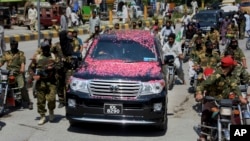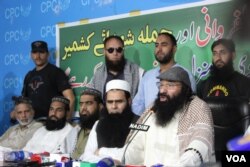The U.S. State Department imposed sanctions on a Pakistan-based Kashmiri militant group, labeling it a foreign terrorist organization.
“The Department of State has designated Hizbul Mujahideen — also known as Hizb-ul-Mujahideen, also known as HM — as a Foreign Terrorist Organization,” the State Department said in a statement Wednesday. The sanctions prohibit U.S. companies and U.S nationals from doing business with the militant group, block its assets in the United States and make it a high-profile target for law enforcement authorities worldwide.
In June, the State Department declared Syed Salahuddin, the Pakistan-based chief of Hizbul Mujahideen, a global terrorist and imposed sanctions aimed at suppressing his organization.
Salahuddin posed “a significant risk of committing acts of terrorism that threaten the security of U.S. nationals, or the national security, foreign policy, or economy of the United States,” the State Department said in a statement after it imposed the sanctions.
‘Party of Holy Warriors’
Founded in 1989 in Muzaffarabad, capital of Pakistan-controlled Kashmir, Hizbul Mujahideen — “the Party of Holy Warriors” — is considered to be the largest militant group in Kashmir.
The group has been branded a terrorist organization by India and the European Union as well.
“Hizbul Mujahideen has claimed responsibility for several attacks, including the April 2014 explosives attack in the state of Jammu and Kashmir, which injured 17 people,” the State Department statement reads.
HM has a large number of operatives on both sides of Kashmir, but its numbers have been shrinking in recent years. The group was estimated to have 10,000 members in 1990, but that figure had reportedly declined to 1,500 by 2011.
Islamabad has historically disputed the allegations against HM and maintained that the militants fighting New Delhi’s rule in Kashmir are involved in a legitimate struggle for self-determination.
“Declaring HM a terrorist organization is selective justice and is an effort by the U.S. to please its ally, India,” Abdul Qayyum, a Pakistani lawmaker who represents the ruling Muslim League party, told VOA. “Hizbul Mujahideen is not a terrorist group; they are fighting for their legit cause of liberation, freedom and self-determination.”
Qayyum added that the U.S. “should not turn a blind eye towards the grave issue of Kashmir where Indian army is killing people and making their lives miserable.”
Not bound to follow decision
Following the designation of HM’s leader as a global terrorist by the U.S. State Department in June, Sartaj Aziz, a former adviser on foreign affairs to Pakistan’s prime minister, told the media that Islamabad was not bound to follow the decision as it was not a U.N. declaration.
India has repeatedly blamed Pakistan-based, anti-India militant groups for inciting violence in Kashmir. More than a dozen militant separatist groups are fighting in Indian-held Kashmir.
According to the India Express news outlet, HM leader Salahuddin has “played a key hand in fueling militancy in Kashmir over the last 27 years.” He is also known for supplying arms and training young recruits and sending them to Kashmir for militant activities, according to the Indian paper.
“The State Department’s decision will strain the Pakistan-U.S. relations, but it seems Pakistan will keep quiet and will not take any step against HM at the moment,” Hasan Askari Rizvi, a Pakistan-based security analyst, told VOA.
“It is an embarrassment for Pakistan that U.S. has declared HM a terrorist group. It is said that Syed Salahuddin, HM’s leader, lives in the Pakistani side of Kashmir, but he moves around in the country freely,” Askari said. “HM will still carry out with their activities, only now they will do it quietly.”
The two South Asian powers and archenemies have gone to war over Kashmir three times: at the time of partition in 1947, and later in 1965 and 1999. Since both India and Pakistan now have nuclear weapons, the element of risk in such conflicts has now risen exponentially.






